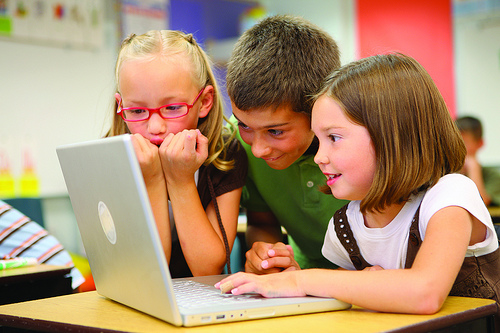Kids’ Guide to Computer Skills and Safety

Using a computer is one of the most important skills you can learn. If you can navigate the Internet quickly and safety, you can get homework done quicker, learn things faster, and connect with your real-life friends better. Use some of these great resources to help you learn about computer skills and safety, but know that you have other resources, too: your parents and teachers. Ask them for help if you don’t know for sure whether or not something is safe, and ask them to help you practice your computer skills!
Keyboarding
Typing is very important, as most jobs you can get as an adult require at least some keyboarding skill. Rather than taking a long time to peck at each letter, practice typing in the correct position. Put both of your feet on the floor, keep your wrists above your desk, and place your fingers on the “home” row. The fingers of your right hand should be on J, K, L, and ; – the fingers of your left hand should be on A, S, D, and F. To type other letters, slightly move each finger away from that home row position. Play some of these games and complete these exercises while practising this technique:
Using a Mouse
Pointing, clicking, double-clicking, right-clicking, and dragging with a mouse are important skills as well. Practising with the mouse can increase your hand-eye coordination and help you to complete tasks faster. Be sure that you are sitting in the right position and that your mouse is near your keyboard (and not too far away so that you’re stretching to grab it). Also, your wrist should not be held on the table but lifted up a bit. As you practice and play these games, you may even find yourself forgetting that you’re using a mouse!
- Placing the Mouse Exercise
- Tidy the Classroom (PDF)
- Red Bugs (Game)
- 10 Tips for Using a Computer Mouse
Opening Software
If you’re checking your email and see a file with a name that ends in .exe, .dll, or .sys, you probably shouldn’t open it unless your parents say it’s alright. Actually, downloading software from the Internet in general can be bad, so be careful about any game you want to play that prompts you to download it. There are other software programs that your parents may have already installed on the computer. Feel free to ask them which ones are OK for you to open. The same can go for a computer at a library – ask a librarian for help. If there’s software that your parents say you can open, like Microsoft Word, double-click its icon to open it!
- Don’t Open That File (Game)
Going Online
The Internet is a wonderfully interesting place, but you should use caution whenever going online. You don’t have to constantly be in fear, but always stop and think before you click on a link. When searching using a common search engine like Google or Bing, you can usually trust sites that end in .gov (government websites) or .edu (college websites). When using social media like Facebook and Twitter, don’t use your real name or become friends with people you don’t know. Talk to your parents before posting pictures or information, and never tell people online where you are in real life.
- The Story of the Internet (Video)
- FBI Cyber Surf Islands (Game)
- The Webonauts Internet Academy (Game)
- Stop. Think. Connect. (Presentation)
Internet Safety
Would you talk to a strange adult who came up to you on the street and tell them lots of information about yourself? If a stranger contacts you online, it’s the same idea. Don’t talk to people you don’t know, and never give out personal information like your name, age, address, school, birthday, or phone number. Don’t share information for any reason, no matter if you’re joining a club or signing up for a game. Also, sometimes people can be rude online, but don’t be rude in return. Be as polite as you would be in person. If you ever see or hear something online that makes you feel uncomfortable, talk to your parent or teacher!
By SoftActivity Team
Photo credit: Lupuca, Flickr